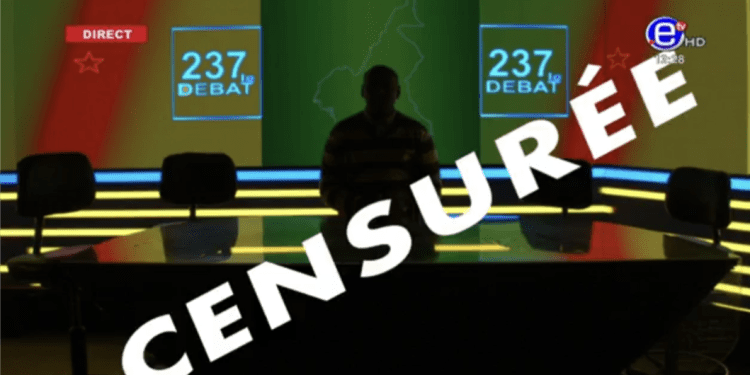The popular private television station, Equinoxe TV, was unable to air its flagship program, 237 le Debat, on Sunday, August 18, after it was suspended by the National Communication Council (NCC).
But to the surprise of many, the channel rather brandished a flier carrying the program title and the inscription “CENSURÉE”, or censored, during the two-hour period of the program (12:00 to 2pm).
The inscription was interpreted as Equinoxe TV’s protest against the NCC decision to suspend the program last week.
237 le Debat was recently introduced to replace the popular debate program, “Droit de Response,” which the NCC suspended two weeks ago.
The program is known for its forceful discussions on pertinent political issues in the country, with guests often sharing critical viewpoints about the government in power.
The government-controlled media regulation body suspended first “Droit de Response” and its presenter Duval Fangwa for failing to regulate panelists’ opinions.
But Equinoxe TV replaced the program with a similar one, 237 le Debat, pissing off the NCC.
In a release dated August 12, the NCC’s President, Joseph Chebonkeng, wrote that “…after suspending some audiovisual programmes in a bid to stop the recurrence of media content that does not comply with the professional and ethical standards that undergird journalism, some media organs such as Equinox TV have insidiously and repeatedly resorted to ploys aimed at replacing suspended programmes, with programmes that have matching formats and broadcast during the same time slots.”
It also called on the management of Equinoxe TV to “immediately cease the broadcast of the 237 Le Débat talk show, which is scheduled in place of Droit de Réponse.”
Despite heeding the NCC’s call to suspend the program, Equinoxe TV viewed the sanction as a ploy to restrict free speech in a country already popular for violating basic rights and freedoms.
Earlier this year, renowned media watchdog, Reporters Without Borders, ranked Cameroon as the 130th country globally in terms of press freedom, out of 180 countries reviewed.
Several media houses and journalists have suffered sanctions from the NCC in the recent past for entertaining vocal guests on their platforms.



